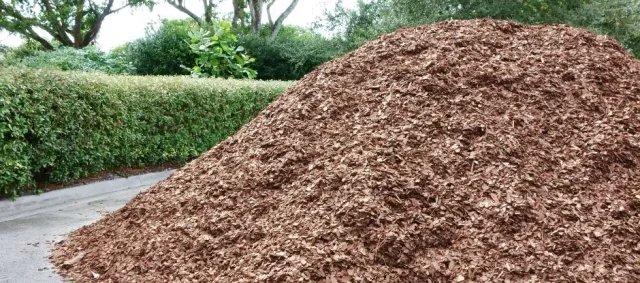Imagine a garden where weeds don’t stand a chance and your plants thrive with minimal watering. Sounds like a dream, right?
Well, with the right mulching techniques, this can be your reality. Mulching is more than just a garden chore; it’s a powerful tool that can transform your outdoor space. By mastering the art of mulching, you can significantly reduce weed growth and lock in moisture, giving your plants the best chance to flourish.
You might be wondering how to get started or which materials to use. Don’t worry, we’ve got you covered! You’ll discover practical mulching tips that will enhance your garden’s health and beauty. Stick around, because this could change the way you garden forever.

Choosing The Right Mulch
Mulching serves as an effective strategy for weed control and moisture retention. The type of mulch you choose plays a crucial role. It can impact plant growth and soil health.
Organic Mulch
Organic mulch includes materials like wood chips, straw, and grass clippings. These materials decompose over time, adding nutrients to the soil. They provide excellent moisture retention and suppress weed growth effectively.
Inorganic Mulch
Inorganic mulch consists of materials like gravel, stones, and plastic. This type does not decompose. It is ideal for areas where long-term weed control is needed. It also helps to retain soil moisture but does not enrich the soil.
Consider Your Climate
The local climate influences mulch choice. In warmer regions, organic mulches prevent soil from overheating. In cooler areas, inorganic mulches can help keep the soil warm.
Mulch Depth Matters
Applying the right mulch depth is essential. Generally, 2-4 inches is recommended. Too thick a layer can suffocate plants. Too thin allows weeds to grow.
Mulch Color
Mulch color affects soil temperature and landscape aesthetics. Dark mulch absorbs heat, warming the soil. Lighter mulch reflects sunlight, keeping the soil cooler.
Local Availability
Select mulch that is readily available locally. This choice reduces costs and environmental impact. Local materials often integrate better into the existing ecosystem.
Effective Mulching Techniques
Mulching helps keep weeds away and holds soil moisture effectively. Choose organic materials like bark or straw. Spread evenly around plants, about 2-3 inches deep. This shields roots and conserves water. Regularly check and refresh mulch to maintain its benefits.
These simple steps ensure a healthier garden.
Mulching is a simple yet powerful technique that can significantly enhance the health of your garden. By mastering effective mulching techniques, you can keep weeds at bay and help your plants retain moisture, ensuring they thrive even during dry spells. Here, we will explore some practical methods to get the most out of your mulch.Types Of Mulch: Organic Vs. Inorganic
Choosing the right type of mulch is crucial. Organic mulches, like wood chips, straw, and leaves, add nutrients to the soil as they decompose. Inorganic options, such as gravel or plastic sheeting, last longer but don’t enrich the soil. Consider your garden’s needs and your personal goals before deciding.Application Tips: How Much And How Often?
The thickness of your mulch layer matters. A 2 to 4-inch layer is generally effective in controlling weeds and retaining moisture. Spread mulch evenly around your plants, leaving a small gap around the stems to prevent rot. Refresh your mulch annually, or as needed, to maintain its benefits.Timing Matters: When To Mulch
Timing is key when applying mulch. The best time to mulch is in late spring, once the soil has warmed up. This helps lock in the soil moisture before summer heat kicks in. However, you can also mulch in late autumn to protect roots during winter.Personal Insight: Learning From Mistakes
I once used inorganic mulch in my vegetable garden, hoping for less maintenance. While it kept the weeds down, my plants didn’t thrive. Switching to organic mulch transformed the soil quality, and my garden flourished. The lesson? Sometimes, a little extra work pays off in the long run.Encouraging Biodiversity: Mulch And Soil Health
Mulching isn’t just about weed control and moisture retention. It also fosters biodiversity in your garden. Organic mulches attract beneficial insects and microorganisms that improve soil health. Consider experimenting with different organic materials to see what works best for your garden ecosystem. As you embrace these techniques, consider how they might change your approach to gardening. What kind of mulch aligns best with your garden’s needs? How can you tailor your mulching strategy to enhance the health and productivity of your plants?Benefits Of Mulching For Weed Control
Mulching serves as a natural barrier against weeds. It reduces the growth of unwanted plants by blocking sunlight. This makes it harder for weeds to sprout and thrive. Mulching also creates a physical layer that weeds struggle to penetrate.
With effective mulching, your garden stays cleaner and more manageable. The time spent pulling weeds decreases significantly. Mulching can transform your gardening routine.
Effective Sunlight Blockage
Mulch blocks sunlight. Weeds need sunlight to grow. Without it, they struggle to survive. This simple process cuts down weed growth dramatically.
Natural Weed Barrier
Mulch acts as a barrier. It stops weed seeds from reaching the soil. With mulch, seeds cannot find a place to grow. This prevents new weeds from forming.
Improved Soil Health
Mulch improves soil health. Healthy soil resists weed invasion. It creates an environment where desired plants thrive. Weeds find it challenging to compete.
Reduced Weed Pulling Effort
Less weed growth means less pulling. Mulching saves time and effort. Gardeners can focus on other tasks. Mulch simplifies garden upkeep.

Enhancing Soil Moisture Retention
Mulching helps keep soil moist by reducing evaporation. It acts as a barrier, protecting the soil from direct sunlight. Mulch also suppresses weed growth, ensuring plants get the necessary nutrients and water.
Enhancing soil moisture retention through mulching can transform your garden into a thriving oasis. By keeping soil moist for longer, you not only save water but also create the perfect environment for plants to flourish. This approach doesn’t just benefit your plants; it makes your gardening efforts more efficient and rewarding.Understanding The Role Of Mulch
Mulch acts as a protective barrier on the soil surface. It prevents water evaporation and keeps the soil cooler. This means less frequent watering, saving both time and resources.Choosing The Right Mulch Type
Different mulches serve different purposes. Organic mulches like straw or wood chips break down over time, enriching the soil. Inorganic options like gravel or plastic can offer longer-lasting protection.Applying Mulch Correctly
Spread mulch evenly over the soil, about 2 to 4 inches thick. Avoid piling it against plant stems to prevent rot. Think of mulch as a blanket – not too thick, not too thin.Monitoring Mulch Effectiveness
Keep an eye on your garden’s moisture levels. If the soil remains dry under the mulch, it may be time to add more. Adjust as needed based on seasonal changes.Personal Experience: Learning The Hard Way
I once used too little mulch, thinking it was enough. My plants wilted quickly in the summer heat. Adding extra mulch made a noticeable difference, keeping the soil moist and my plants healthy. How does your garden fare in the heat? Experiment with different mulch types and thicknesses. You might discover a new balance that works perfectly for your plants.
Conclusion
Mulching offers simple, effective weed control and moisture retention. It creates a barrier that suppresses weed growth. Mulch helps soil retain moisture, reducing water needs. Choose organic mulch for natural benefits. Spread mulch evenly for best results. Regularly check and refresh mulch as needed.
This practice enriches soil health and boosts plant growth. Gardening becomes easier and more rewarding with these mulching tips. Start mulching today for healthier plants and fewer weeds. Your garden will thank you with vibrant blooms and lush greenery. Enjoy a thriving garden without extra effort.


